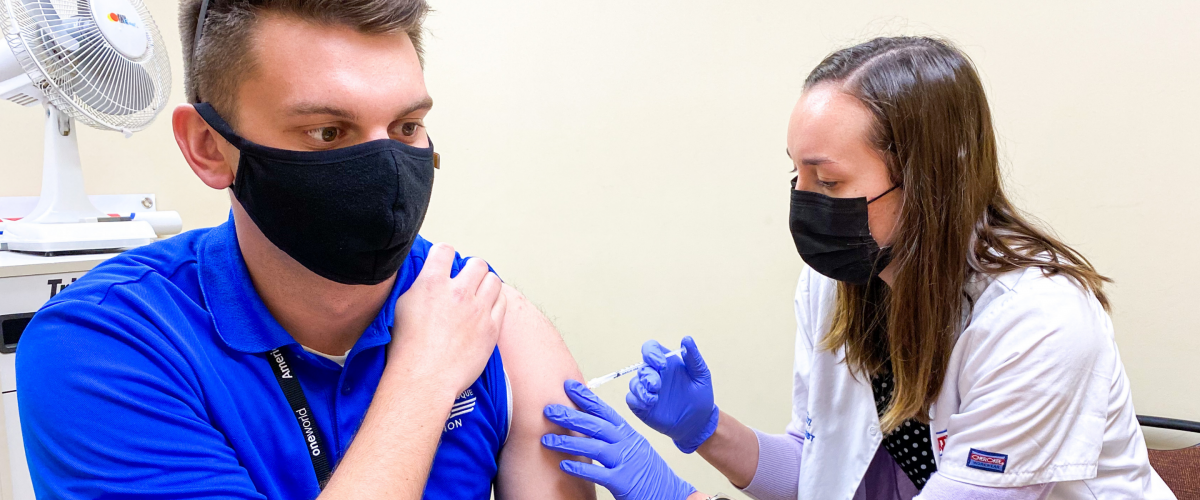- May 10, 2021
- Brandon Hefel, PharmD Candidate, Student Pharmacist-Intern
- Covid-19

Are you a young adult questioning why you need to get the Covid-19 vaccine? Let’s take a look at why young adults should consider getting vaccinated!
Most experts agree that advanced age and medical comorbidities (i.e., obesity, heart disease, diabetes, etc.) are factors that increase your risk for Covid-19 infection, hospitalization, and death. Generally, those who are young and healthy are at a lower risk for Covid-19 complications (see chart below).
Information such as this may not convince a young adult to get the Covid-19 vaccine. However, anyone can have a mild to severe infection. Although most individuals return to full health in a few days, some people experience post-Covid symptoms or "Long COVID." Long COVID can lead to a wide range of symptoms. They can be new or returning health problems, and they can occur more than four weeks after an individual is infected with the virus.1 Commonly reported symptoms include:
- Tiredness or fatigue
- Difficulty concentrating
- Headache
- Loss of smell or taste
- Fast-beating or pounding heart
- Difficulty breathing
- Symptoms that get worse with physical or mental activities
Covid-19 vaccines are a safe and effective method to boost your body's immune response and lower your chances of suffering from Covid complications. In addition, the benefits of vaccines reach far beyond individual protection. By receiving a vaccine, we can reduce person-to-person transmission and protect those around us, including friends, family, and loved ones. No one wants to be responsible for passing a harmful disease to their loved ones, especially a vaccine-preventable disease. Infants, older adults, and other individuals with weakened immune systems need our help – through vaccination-induced immunity.
The ultimate goal of our vaccination efforts is to achieve increased levels of immunity, sometimes called “herd immunity.”2 When a larger part of the U.S. population is vaccinated, and COVID-19 cases and infection rates are minimized, it is likely that we will all start to experience a sense of “normalcy.” Early estimates suggest at least 70 percent of the population must be vaccinated to see the initial benefits of herd immunity.3 Recently, in the news, epidemiologists and other public health experts have debated levels of immunity and return of many “normal” activities such as large gatherings, sporting events, and concerts.
Many diseases that were once responsible for harming thousands of people have been significantly reduced or nearly eliminated in the United States due to vaccines. A notable example is the polio virus. Polio was once one of the most feared diseases in the United States. Approximately 90 to 95 percent of polio cases were asymptomatic!4 It caused more than 15,000 cases of paralysis each year in the early 1950s. Patients whose paralysis affected their breathing would receive treatment with the iconic "iron lung" (below). Following the introduction of vaccines, cases quickly fell below 100 in the 1960s and below 10 in the 1970s. Thanks to vaccines, the United States has been polio-free since 1979.5 This is an excellent example of how access to vaccines can save lives and change the course of human history.
More than ever, Covid-19 vaccines are readily available, making access to this crucial vaccination even easier. Adding to the ease of access, individuals who prefer a single dose versus two-dose series can now get the Johnson and Johnson (J&J) vaccine. The Centers for Disease Control and Prevention (CDC) and the Food and Drug Administration (FDA) recently resumed the J&J Covid-19 vaccine. After reports suggested an increased risk of very rare blood clots, J&J vaccines were paused to study these adverse events. The CDC and FDA resumed the J&J vaccinations concluding that the vaccine's benefits outweigh the potential risks. Below is a chart that compares the risks of blood clots in various populations. Of note, patients infected with Covid-19 have a 20 percent risk of developing blood clots compared to less than 0.0001 percent of patients who receive the J&J vaccine. According to the CDC, there is a higher chance of being struck by lightning, as the odds are roughly one in 500,000 people (or 0.0002 percent) per year.
Don't let your age convince you a Covid-19 vaccine isn't needed. Vaccinating our community is a group effort; both young and old will need to be active participants. Get vaccinated today and help protect your loved ones and your community from Covid-19.
Hartig Drug now offers walk-in Covid-19 vaccinations. You can also schedule an appointment at www.hartigdrug.com/appointment.
References
- CDC. "COVID-19 and Your Health." Centers for Disease Control and Prevention, 11 Feb. 2020, https://www.cdc.gov/coronavirus/2019-ncov/long-term-effects.html.
- "Coronavirus Disease (COVID-19): Herd Immunity, Lockdowns and COVID-19." World Health Organization, https://www.who.int/news-room/q-a-detail/herd-immunity-lockdowns-and-covid-19. Accessed 5 May 2021.
- Anderson RM, Vegvari C, Truscott J, Collyer BS. Challenges in creating herd immunity to SARS-CoV-2 infection by mass vaccination. Lancet. 2020 Nov 21;396(10263):1614-1616. doi: 10.1016/S0140-6736(20)32318-7. Epub 2020 Nov 4. PMID: 33159850; PMCID: PMC7836302.
- "Disease Factsheet about Poliomyelitis." European Centre for Disease Prevention and Control, https://www.ecdc.europa.eu/en/poliomyelitis/facts. Accessed 5 May 2021.
- CDC. "Polio Elimination in the U.S." Centers for Disease Control and Prevention, 25 Oct. 2019, https://www.cdc.gov/polio/what-is-polio/polio-us.html.







